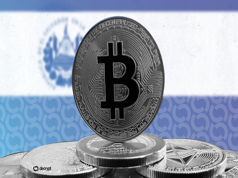El Salvador's Bitcoin warehouse exceeded US $ 760 million when BTC peaked at US $ 122,000, a national strategy is being effective.

In the context that Bitcoin continues to set a new peak, surpassing the $ 122,000 milestone on Sunday, El Salvador of the world first in the world recognizes Bitcoin as a legal currency that is witnessing incredible profits from the cryptocurrency investment strategy that lasts more than three years. With a total of 6,237 BTC existing, the value of Bitcoin reserves of this Central American nation has exceeded the threshold of US $ 762 million, nearly three times higher than the average cost base estimated at 42,000 USD/BTC.
Long -term repayment strategy
Since 2021, under the leadership of President Nayib Bukele, El Salvador has actively accumulated Bitcoin, despite the pressure from the International Monetary Fund (IMF), the opposition from domestic opposition parties and the concern of the international community. In the period of BTC price dropped deeply by 2022 and early 2023, Bukele's decision to continue "Buy The Dip" was considered by many experts.
However, in the middle of 2025, the market movements were significantly reversed. With the price of Bitcoin being trading around US $ 122,000 and continuing to have a rise, El Salvador's profits have far exceeded many traditional fiscal investments of other countries.
According to Arkham Intelligence, the total value of digital assets held by El Salvador is currently at more than 762 million USD, bringing the country to the global leading group in terms of sovereign bitcoin reserves.
New vision of national reserve property
Pranav Agarwal Independent Director at Jetking Infotrain (India), which owns one of the first Bitcoin treasures in Asia, said that El Salvador's approach could become a model for countries looking for property protection tools in the long term.
"Bitcoin should be considered part of the national strategic reserve. The situation of El Salvador is now a clear evidence for the accumulated value that the digital assets brought in the 4-5 years," he said.
According to Agarwal, if the cryptocurrency policy receives domestic political consensus, the internal legal risk will be insignificant, while the ability to resist international pressure is completely feasible.
Confrontation with international pressure
Despite the financial success, El Salvador's cryptocurrency strategy is inevitably controversial. In June, three US senators Tim Kaine (Virginia), Chris van Hollen (Maryland) and Alex Padilla (California) - submitted to the bill "El Salvador Accountability Act 2025", called for investigation of Bukele government Bitcoin use and consider imposing sanctions.
President Bukele immediately responded strongly on the X platform, saying that this move was a "political motive" and hindered El Salvador's innovation process. "Dems is just salty," he wrote sarcastically, in the post that attracted millions of interactions.
Earlier, El Salvador was under strong pressure from the IMF, forcing the government to adjust the Bitcoin law to allow businesses to choose not to accept BTC. Even so, Bukele continues his path, considering Bitcoin as the new "financial spine" of the country in the digital age.
Prospects and risks
According to analysts, Bitcoin's disrupting an important $ 120,000 resistance has opened up to the $ 124,000 - $ 125,000 price area in the short term. Pankaj Balani - CEO of Delta Exchange said that the large trading volume with the trend of buying strongly is the factor that promotes the market up in the near future.
However, accompanied by rewards are significant risks. The "All-in" strategy into Bitcoin makes El Salvador depend on the fluctuations of a speculative property. Despite great profits, the country also faces system risks if the market reverses unexpectedly.
El Salvador of the national financial revolution
Despite controversy, El Salvador's Bitcoin strategy has proven vitality over time and endurance against international pressure. With the country's digital treasury, the top of the world's largest Bitcoin reserve funds, a new chapter in national financial history, is being written with BTC as the center.
If the momentum continues, El Salvador not only becomes a model for developing countries in the web3 era, but also can regenerate the way the world recognizes financial reserves in the 21st century.
